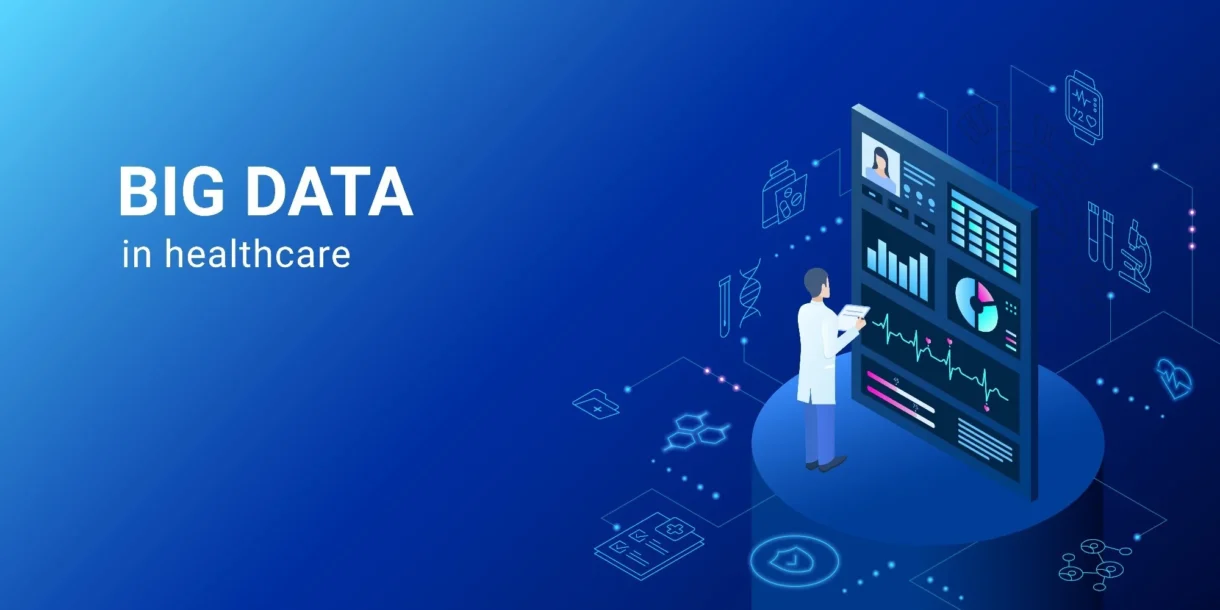Tech
Big Data in Action – Streamlining Healthcare Operations and Reducing Cost

In the rapidly evolving landscape of healthcare, the integration of big data analytics has emerged as a game-changer, revolutionizing patient care, operational efficiency, and clinical outcomes. As healthcare organizations harness the power of big data, they gain invaluable insights into patient populations, treatment protocols, and healthcare delivery models, paving the way for transformative advancements in the industry.
In this comprehensive blog, we’ll explore the significance of big data analytics in healthcare, delve into viable use cases, highlight the benefits, and examine its potential to improve patient care and user experience.
What is Big Data Analytics in Healthcare?
Big data analytics in healthcare refers to the process of analyzing vast volumes of healthcare data to uncover patterns, trends, and insights that can inform decision-making, improve outcomes, and drive innovation. It encompasses the collection, storage, processing, and analysis of diverse data sources, including electronic health records (EHRs), medical imaging, genomics, wearable devices, and social determinants of health.
6 Viable Use Cases of Big Data and Analytics in Healthcare
Predictive Analytics for Disease Prevention:
By analyzing large datasets of patient demographics, medical history, and risk factors, healthcare organizations can develop predictive models to identify individuals at risk of developing chronic diseases such as diabetes, cardiovascular diseases, and cancer. Early intervention and targeted preventive measures can help reduce disease burden and improve population health outcomes.
Precision Medicine and Personalized Treatment:
Big data analytics enables healthcare providers to leverage genomic data, molecular profiling, and clinical data to tailor treatment plans and therapies to individual patient’s genetic makeup, disease characteristics, and treatment response. Personalized medicine approaches improve treatment efficacy, minimize adverse effects, and enhance patient outcomes.
Healthcare Resource Optimization:
By analyzing operational data such as patient flow, staffing levels, equipment utilization, and supply chain logistics, healthcare organizations can optimize resource allocation, improve workflow efficiency, and reduce healthcare costs. Predictive analytics models can forecast patient demand, enabling hospitals to adjust staffing levels and resource allocation accordingly.
Population Health Management:
Big data analytics facilitates population health management initiatives by analyzing aggregated patient data from diverse sources to identify high-risk populations, track health trends, and evaluate the effectiveness of interventions. Population health analytics enables healthcare organizations to implement targeted interventions, preventive care programs, and health promotion campaigns to improve outcomes and reduce healthcare disparities.
Medical Imaging and Diagnostic Decision Support:
Advanced imaging technologies generate vast amounts of medical imaging data, including X-rays, MRI scans, and CT scans. Big data analytics techniques such as machine learning and deep learning enable automated image analysis, pattern recognition, and diagnostic decision support, assisting radiologists and clinicians in interpreting images, detecting abnormalities, and making accurate diagnoses.
Real-Time Health Monitoring and Remote Patient Monitoring:
With the proliferation of wearable devices and IoT sensors, healthcare organizations can collect real-time health data from patients in their home environments. Big data analytics enables continuous monitoring of vital signs, activity levels, and health metrics, empowering clinicians to detect early warning signs, monitor chronic conditions, and intervene promptly to prevent complications.
Benefits of Big Data Analytics in Healthcare
Enhanced Clinical Decision-Making:
Big data analytics provides clinicians with actionable insights and evidence-based recommendations to support clinical decision-making, leading to more accurate diagnoses, personalized treatment plans, and improved patient outcomes.
Improved Operational Efficiency:
Healthcare organizations can streamline administrative processes, optimize resource allocation, and reduce waste by leveraging big data analytics to analyze operational data and identify areas for improvement.
Cost Reduction:
By optimizing care delivery, preventing avoidable hospital admissions, and reducing readmissions, big data analytics helps healthcare organizations reduce healthcare costs while improving quality of care and patient satisfaction.
Early Disease Detection and Prevention:
Big data analytics enables proactive identification of individuals at risk of developing chronic diseases, enabling early intervention, preventive measures, and lifestyle modifications to mitigate disease progression and improve population health outcomes.
Patient Engagement and Empowerment:
By leveraging big data analytics to personalize patient communications, deliver targeted health education, and facilitate shared decision-making, healthcare organizations can engage patients more effectively in their care and empower them to take an active role in managing their health.
Improve Patient Care and User Experience
Enhanced Care Coordination:
Big data analytics facilitates seamless communication and collaboration among healthcare providers, enabling care coordination across multiple care settings and disciplines to ensure continuity of care and improve patient outcomes.
Patient-Centric Care Delivery:
By analyzing patient data and preferences, healthcare organizations can tailor care delivery to meet individual patient needs, preferences, and expectations, enhancing patient satisfaction and engagement.
Proactive Health Management:
Big data analytics enables proactive monitoring of patient’s health status, identification of potential health risks, and timely interventions to prevent complications and improve health outcomes.
Big data applications in healthcare span a wide range of areas, revolutionizing the industry and transforming the way patient care is delivered, managed, and optimized. Here are some key applications of big data in healthcare:
Population Health Management:
Population health management involves analyzing and managing the health outcomes of a group of individuals, aiming to improve overall health and well-being while reducing healthcare costs. Big data analytics plays a crucial role in population health management by aggregating and analyzing vast amounts of data from diverse sources, including electronic health records (EHRs), claims data, social determinants of health, and environmental factors. By identifying high-risk populations, predicting disease trends, and targeting interventions, healthcare organizations can proactively manage population health, prevent chronic diseases, and improve health outcomes on a community-wide scale.
Telehealth and Telemedicine:
Telehealth and telemedicine leverage technology to deliver healthcare services remotely, enabling patients to access medical care and consultations from the comfort of their homes. Big data analytics enhances telehealth and telemedicine by facilitating remote patient monitoring, analyzing patient-generated health data, and predicting health outcomes. By leveraging real-time data insights, healthcare providers can deliver more personalized and effective care, monitor patients’ health status remotely, and intervene promptly to prevent complications or exacerbations.
Supply Chain Management:
Supply chain management in healthcare involves managing the flow of medical supplies, equipment, and pharmaceuticals to ensure timely and efficient delivery of healthcare services. Big data analytics optimizes supply chain management by analyzing data on inventory levels, demand forecasting, supplier performance, and logistics. By leveraging predictive analytics models, healthcare organizations can anticipate supply shortages, optimize inventory levels, and streamline distribution processes, ensuring uninterrupted access to essential medical supplies and reducing costs.
Hospital Management:
Hospital management encompasses various administrative and operational functions within a healthcare facility, including patient admissions, bed management, staffing, and resource allocation. Big data analytics enhances hospital management by analyzing operational data, patient flow patterns, and resource utilization to optimize efficiency and improve patient care. By identifying bottlenecks, streamlining workflows, and optimizing staffing levels, healthcare administrators can enhance hospital operations, reduce wait times, and improve patient satisfaction.
Electronic Health Record (EHR) Management:
Electronic Health Records (EHRs) digitize patient medical records, enabling healthcare providers to access and share patient information securely. Big data analytics enhances EHR management by analyzing large volumes of structured and unstructured data within EHR systems, including clinical notes, lab results, and imaging reports. By leveraging natural language processing (NLP) and machine learning algorithms, healthcare organizations can extract valuable insights from EHR data, improve clinical documentation, and enhance care coordination across care settings.
Pharmaceutical Management:
Pharmaceutical management involves the development, manufacturing, distribution, and monitoring of pharmaceutical products and medications. Big data analytics revolutionizes pharmaceutical management by analyzing data from clinical trials, drug interactions, adverse events, and patient outcomes. By leveraging big data analytics, pharmaceutical companies can accelerate drug discovery, optimize clinical trial designs, and personalize treatment approaches. Additionally, big data analytics enables pharmacovigilance efforts to monitor drug safety, detect adverse events, and ensure regulatory compliance throughout the drug lifecycle.
Conclusion –
Big data analytics has the potential to revolutionize healthcare delivery by unlocking valuable insights, enhancing clinical decision-making, improving operational efficiency, and empowering patients to take control of their health. By leveraging big data analytics, healthcare organizations can drive transformative advancements in patient care, population health management, and healthcare delivery models, ultimately leading to better outcomes, lower costs, and improved patient experiences.
Ready to harness the power of big data analytics to transform your healthcare organization? Contact Data Nectar Technosys today to discover our cutting-edge solutions tailored to meet your unique needs and drive healthcare transformation. Let’s collaborate to unlock the full potential of big data analytics and pioneer a new era of innovation in healthcare.
Tech
Environmental Benefits of Chopped Strand Mat

Key Benefits
As industries increasingly focus on sustainability, the environmental impact of materials used in manufacturing processes has become a critical consideration. Chopped Strand Mat (CSM) is no exception, and its environmental benefits, including recyclability and eco-friendly properties, are essential for its growing adoption in sectors such as automotive, marine, construction, and renewable energy. When compared to other traditional materials, CSM stands out for several key reasons, from its durability and lower environmental footprint during production to its potential for recycling and reuse. This article explores the environmental benefits of CSM and how it contributes to more sustainable manufacturing practices.
Recyclability of Chopped Strand Mat
One of the primary environmental advantages of Chopped Strand Mat (CSM) is its potential for recycling. While fiberglass, including CSM, is often considered difficult to recycle due to its complex composite nature, advancements in recycling technologies are making it increasingly feasible. The ability to recycle CSM not only contributes to reducing waste but also supports the growing demand for sustainable materials across various industries, including the production of cable ladder.
Cable ladder, which are widely used in electrical and communication systems to support and organize cables, can also benefit from the recyclability of CSM. Traditionally, cable ladders were made from metals like steel or aluminum, which required energy-intensive processes to manufacture and were subject to corrosion. However, with the shift toward fiberglass-based composites such as CSM, the potential for recycling these products at the end of their life cycle has increased.
- Mechanical Recycling: CSM, like other fiberglass-based products, can be processed through mechanical recycling methods. This involves breaking down the fiberglass composite into its individual components, such as glass fibers and resins, which can then be reused. Mechanical recycling of CSM typically results in the glass fibers being cleaned, repurposed, and used in the production of new composite materials, which helps reduce the need for virgin raw materials.
- Chemical Recycling: A more advanced form of recycling, chemical recycling involves breaking down the resin binder used in CSM into its chemical components, which can then be reused in the creation of new products. This process helps minimize waste and can significantly reduce the environmental impact of production, especially when the resin is derived from renewable sources.
- Circular Economy: The recyclability of CSM is in alignment with the principles of a circular economy, where materials are continuously reused, reducing the need for landfilling and conserving natural resources. As industries adopt more circular practices, the ability to recycle materials like CSM becomes an increasingly important factor in its sustainability.
Reduction in Material Waste
The manufacturing process of CSM generates minimal waste compared to many other traditional materials. The fibers used in CSM are carefully controlled during the cutting process, and excess materials can often be reused, either in the same production cycle or in the creation of other fiberglass products. This reduces the overall material waste and ensures a more efficient use of raw materials.
- Zero Waste Initiatives: Many manufacturers of fiberglass products, including CSM, have adopted zero-waste initiatives to further minimize environmental impact. This includes reusing offcuts and defective mats during the production process or sending waste materials to specialized facilities for recycling. By reducing waste at every step of the manufacturing cycle, CSM helps support environmentally responsible manufacturing.
Energy Efficiency and Reduced Carbon Footprint
The production of Chopped Strand Mat is energy-intensive but generally more efficient than the manufacturing of many other materials, particularly metals like steel or aluminum. CSM is primarily made from glass fibers, which are derived from sand and other natural resources. The energy required to produce glass fibers and process them into CSM is relatively low compared to the extraction and processing of metals, making CSM a more energy-efficient alternative in certain applications.
- Lower Embodied Carbon: The energy required to produce fiberglass products such as CSM is significantly lower than that for materials like aluminum or steel, which require high-temperature furnaces for production. This results in a lower embodied carbon, making CSM a more sustainable choice in industries focused on reducing carbon emissions.
- Durability and Longevity: CSM products are incredibly durable and resistant to environmental factors like moisture, UV radiation, and temperature changes. This long lifespan reduces the need for frequent replacements, which in turn lowers the overall carbon footprint associated with manufacturing, transportation, and disposal. For example, CSM is often used in the construction of boat hulls and automotive parts, both of which are subject to demanding conditions. The longevity of these materials means that fewer resources are consumed over time.
Non-toxic and Low Environmental Impact
Fiberglass, the core material used in Chopped Strand Mat, is non-toxic and does not release harmful substances into the environment during its manufacturing or use. Unlike some synthetic polymers and resins, which may contain harmful chemicals or release volatile organic compounds (VOCs), fiberglass is inherently safer for both human health and the environment.
- Safer for Workers: The production of fiberglass products like CSM does not involve the same hazardous chemicals that are found in many other composite materials. This reduces the risk of exposure to harmful substances for workers in the manufacturing process, contributing to a safer and more sustainable working environment.
- Low VOC Emissions: Many types of resins used in composite materials release volatile organic compounds (VOCs) during the curing process, contributing to air pollution. However, many CSM manufacturers are increasingly using low-VOC or VOC-free resins, making the production of CSM more eco-friendly. These advances reduce the environmental footprint and make the manufacturing process safer for both workers and the surrounding environment.
Lightweight Properties Leading to Reduced Energy Consumption
Chopped Strand Mat is lightweight compared to traditional building materials like metals or concrete. This characteristic has several environmental advantages, particularly in industries such as transportation and construction. For example:
- Automotive Applications: In the automotive industry, lighter materials lead to improved fuel efficiency and reduced carbon emissions. The use of CSM in vehicle manufacturing can help reduce the weight of cars, trucks, and other vehicles, ultimately contributing to lower fuel consumption and a smaller carbon footprint.
- Marine and Aerospace: Similarly, in marine and aerospace industries, the use of lightweight fiberglass materials like CSM helps reduce the energy required to propel boats and aircraft. This leads to less fuel consumption and reduced environmental impact during operation.
- Cable Ladders and Fiberglass Sheets: In both cable ladder systems and fiberglass sheets, the use of non-toxic materials ensures that no harmful emissions are released during production or usage. This is especially important in industries where worker safety and environmental health are top priorities, such as in the construction of electrical infrastructure or building facades.
Biodegradable and Natural Fiber Alternatives
While CSM itself is not biodegradable, it can be combined with natural fiber alternatives to improve its eco-friendly properties. For example, manufacturers are exploring the combination of CSM with bio-based resins or natural fibers like hemp, flax, or jute. This hybrid approach can result in products that are more biodegradable or have reduced environmental impact at the end of their lifecycle.
- Bio-composites: The development of bio-composites using natural fibers and bio-resins is an emerging trend in the CSM market. These bio-composites are designed to be more sustainable, offering a more eco-friendly alternative to traditional fiberglass composites. Such advancements contribute to a more sustainable lifecycle for CSM products.
Tech
The Growing Market for Audio Jammers

The Market Dynamics of Audio Jammers and Their Evolving Role
The market for audio jammers is experiencing steady growth due to increasing concerns about privacy, security, and surveillance. These devices, designed to disrupt unwanted audio signals, are gaining traction across a wide range of industries, including corporate, government, military, and personal privacy. As surveillance technology continues to advance, the market for audio jammers is expanding, with additional innovations such as Drone Jammer Gun and Drone RF Detection contributing to a more sophisticated approach to counter-surveillance.
Key Drivers of Market Growth
Rising Privacy Concerns
With the growing prevalence of surveillance technologies, including hidden microphones and audio-recording devices, the demand for audio jammers has increased. Individuals and organizations are increasingly concerned about unauthorized eavesdropping, particularly in environments where sensitive or confidential information is exchanged. This has driven the adoption of audio jammers in sectors such as corporate boardrooms, legal offices, and government facilities, where protecting information from external threats is paramount.
Increased Use of Surveillance Technology
The proliferation of consumer and professional surveillance devices, such as hidden microphones, drones with audio capabilities, and remote listening systems, has expanded the market for audio jammers. As more people and organizations become aware of the potential risks posed by surveillance technology, the need for countermeasures like audio jammers is rising.
Government and Defense Applications
Government agencies and defense contractors have been major adopters of audio jammers to protect against espionage and cyber-attacks. These sectors require robust security measures to safeguard sensitive information and prevent unauthorized interception of communications. Audio jammers are also used by military and intelligence agencies in the field to thwart enemy surveillance and maintain operational security.
Growing Security Concerns in Business and Personal Privacy
In addition to the government and defense sectors, businesses, especially those involved in intellectual property (IP) and confidential dealings, are adopting audio jammers to protect their trade secrets. High-profile industries, such as technology, pharmaceuticals, and finance, are increasingly concerned about information leaks, leading to greater demand for privacy-enhancing tools. In personal privacy, individuals concerned about eavesdropping, such as in their homes or personal spaces, are also contributing to market growth.
Key Applications of Audio Jammers
Corporate and Legal Sectors
In the corporate world, audio jammers are primarily used in boardrooms, meeting spaces, and executive offices where confidential discussions take place. These devices help prevent unauthorized audio recording and eavesdropping. Legal professionals, especially those handling sensitive client cases or confidential legal documents, also use audio jammers to ensure their conversations remain private and secure.
Government and Military
Government agencies and military personnel utilize audio jammers as part of their security protocol. These devices are particularly important for preventing espionage and surveillance during high-level diplomatic talks, intelligence operations, and defense missions. Audio jammers are used in embassies, government offices, and military installations to maintain confidentiality and operational security.
Personal Privacy
With the increasing concern about personal privacy, individuals are increasingly investing in audio jammers for their homes or vehicles. These devices are used to block any potential surveillance from hidden microphones or listening devices, providing individuals with peace of mind in their personal spaces. Additionally, individuals who are subject to unwanted attention, such as public figures or whistleblowers, may use audio jammers to protect their privacy.
Events and Conferences
At high-profile events, such as business conferences, product launches, or political summits, the use of audio jammers has become more common. These events often attract journalists, competitors, or other parties who may attempt to intercept sensitive discussions or gain access to proprietary information. Audio jammers are employed in such settings to safeguard against unauthorized recording and eavesdropping.
Challenges in the Audio Jammer Market
Legal and Regulatory Issues
One of the significant challenges facing the audio jammer market is the complex legal landscape. The use of audio jammers is heavily regulated in many countries, and in some places, it is outright illegal to use them, particularly in public spaces or areas with critical communications infrastructure. The risk of fines or legal penalties for using jammers in unauthorized locations can deter potential users and create barriers to market growth. The legal framework surrounding audio jammers varies widely across regions, so users must be aware of local regulations to avoid violations.
Health and Safety Concerns
Another challenge with audio jammers, especially those operating at ultrasonic frequencies, is the potential health risks they pose. Prolonged exposure to high-frequency sounds can cause discomfort or even hearing damage, particularly for sensitive individuals or animals. Some audio jammers can also interfere with medical devices, such as hearing aids or implantable devices, raising concerns about their safe usage in environments where vulnerable individuals may be present.
Technological Limitations
While audio jammers are effective in many scenarios, they are not foolproof. Advanced surveillance technologies, such as those using encrypted communications or spread-spectrum techniques, can sometimes bypass traditional jamming methods. Similarly, Drone RF Detection and Drone Jammer Gun may struggle with more sophisticated drones that use advanced communication protocols or operate at high altitudes. Continuous innovation is required to improve the effectiveness of these devices and address evolving surveillance technologies.
Consumer Awareness and Adoption
Despite the growing concern about privacy, there remains a lack of widespread awareness about audio jammers and their effectiveness. Many consumers and businesses are unaware of the options available to protect themselves from audio surveillance. Educational efforts and greater visibility of the benefits of audio jammers are necessary to accelerate adoption in both the consumer and enterprise markets.
Future Outlook for the Audio Jammer Market
The future of the audio jammer market looks promising as privacy concerns continue to grow across both personal and professional domains. As the technology behind audio jammers improves, and as more people become aware of the need to protect their conversations, the demand for these devices is expected to rise.
The integration of advanced technologies like Drone Jammer Guns and RF Detection Systems with audio jammers could further enhance their effectiveness, enabling users to protect against both physical and digital surveillance. With the increasing risk of cyber threats and data breaches, the need for robust counter-surveillance tools will likely drive further innovation in the audio jammer market.
Furthermore, as regulatory bodies adjust their stance on the use of jamming devices, more balanced and standardized regulations may emerge, which could help drive growth in the market by allowing greater usage in controlled environments.
Tech
Top Technology Trends in Accounting and Financial Services

Accounting and financial services are transforming with the rise of new technologies. Three significant trends are shaping this change. First, artificial intelligence is becoming a game changer. It streamlines processes, reduces errors, and boosts efficiency. Second, blockchain technology is gaining traction. It offers transparency and security in transactions, which is invaluable. Lastly, cloud-based solutions are making data access and collaboration easier than ever. Businesses like Padgett Business Services are leveraging these innovations to enhance their offerings. They are not alone in recognizing the potential. Many financial institutions are already integrating these technologies. This shift does not just mean quicker services. It also means more accurate and reliable outcomes. Understanding these trends is essential for staying competitive. They are not just fleeting changes. These are foundational shifts that will continue to reshape how accounting and financial services operate. Embracing them can pave the way for sustained growth and improved service delivery.
Artificial Intelligence in Accounting
Artificial intelligence (AI) is revolutionizing accounting. It automates repetitive tasks like data entry and categorization. This frees up accountants to focus on more strategic activities. AI can also analyze large volumes of data quickly. This leads to better decision-making based on accurate insights. Moreover, AI helps in detecting anomalies and potential fraud. It constantly monitors transactions and flags unusual patterns.
A simple example of AI in action is automated bookkeeping. Systems can now learn from transaction history. They predict and apply the correct account codes, reducing manual intervention. AI-powered chatbots are also common. They assist with customer inquiries, providing instant responses and improving customer satisfaction.
Blockchain Technology’s Impact
Blockchain is another vital trend. It creates a secure and transparent ledger of transactions. This is crucial for financial services, where trust and accuracy are paramount. Blockchain reduces the risk of errors and fraud. Once a transaction is recorded, it cannot be altered. This feature makes auditing simpler and more reliable.
For example, consider cross-border payments. Traditional methods can take days, but blockchain provides near-instantaneous transfers. This speed benefits both individuals and businesses. They enjoy reduced costs and improved cash flow.
According to the Federal Reserve, blockchain has the potential to improve the efficiency of payment systems. It is not yet widely adopted, but its advantages are clear. Gradually, more institutions are exploring its use in various applications beyond payments.
The Rise of Cloud-Based Solutions
Cloud computing is changing how accounting services are delivered. It offers several benefits over traditional methods. First, it allows real-time access to financial data from anywhere. This flexibility is essential in today’s fast-paced world. Second, cloud solutions enable seamless collaboration. Teams can work on the same documents simultaneously, improving efficiency.
Security is often a concern with cloud solutions. However, providers invest heavily in ensuring data protection. Features like encryption and multi-factor authentication safeguard sensitive information.
A popular application of cloud technology is accounting software. Solutions like QuickBooks Online and Xero offer cloud-based services. They eliminate the need for physical servers and regular software updates. These platforms also integrate with various apps, providing a comprehensive financial management ecosystem.
Comparison Table: Traditional vs. Modern Accounting Technologies
| Aspect | Traditional Accounting | Modern Accounting Technologies |
| Data Entry | Manual | Automated with AI |
| Data Access | Location-bound | Cloud-based, accessible from anywhere |
| Transaction Security | Centralized | Blockchain-enhanced |
| Collaboration | On-site | Online, real-time |
| Error Detection | Manual audits | AI-driven monitoring |
Future Outlook
The integration of these technologies is just the beginning. As they evolve, they will further transform the landscape. Staying informed on developments is crucial. For instance, the National Institute of Standards and Technology regularly updates its guidelines on cybersecurity, which is vital as more operations move online.
Innovation in accounting and finance is not slowing down. Technologies like machine learning and predictive analytics are on the horizon. They promise even greater advancements. Businesses that stay ahead of these trends will not only survive but thrive in this dynamic environment.
-

 Home Improvement6 months ago
Home Improvement6 months agoEssential Drain Cleaning Tips for Brampton Residents
-

 Fashion11 months ago
Fashion11 months agoAttractive Beach Dresses: Elevate Your Look with These Ideas
-

 Entertainment10 months ago
Entertainment10 months agoNetnaija: Your One-Stop Shop for Free Movies in Africa
-

 Pets10 months ago
Pets10 months agoPawsitively Perfect: The Types of Dog Harness Bundle for Your Furry Friend
-

 News10 months ago
News10 months agoWhat Are the Biggest Challenges in Marine Construction Projects in Australia?
-

 Health11 months ago
Health11 months agoUnderstanding Ftmç: Gender-Affirming Surgery
-

 Business11 months ago
Business11 months agoHow Professional Concrete Cleaning Wins Repeat Business
-

 Entertainment12 months ago
Entertainment12 months agoUnlocking Cinematic Pleasures: A Comprehensive Look at Rebahin, the Free Movie Streaming Haven
















